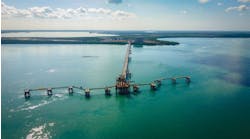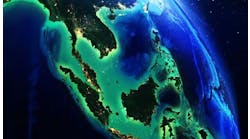Today, corruption in global business is a huge problem, massive in scale and traditionally ignored. And while it may not be the oldest vice in human history, it is probably a close second.
The World Bank estimates the total volume of bribes paid annually at one trillion dollars – nearly twice Africa’s gross domestic product. The amount lost due to bribery in government procurement is estimated at $400 billion per year worldwide. Corrupt practices also prevent billions of dollars in development aid and foreign direct investment from reaching their intended targets.
What’s more, corruption affects national security of many nations. It often supports the repressive societies that breed discontent and terrorism, at a time when economic development remains our best and most practical response. Anything that threatens such economic development exacerbates the situation.
But that’s not all. Corruption also depletes national wealth as scarce resources are directed to lower-priority projects. It inhibits democracy and the rule of law, undermines trust in political systems, institutions and leadership, and encourages the exploitation of natural resources. And by the way, corruption is not limited to developing countries.
Finally, there is bribery’s substantial cost to business. Ethical companies pay dearly for refusing to engage in bribery and the unfair competition that results. It is hard to know exactly how much business has been lost, but it’s believed to be in the hundreds of billions of dollars.
Under the US Foreign Corrupt Practices Act, contracts requiring corrupt payments have been off limits to US companies for more than a quarter century. Until relatively recently, however, few other industrialized countries outlawed foreign bribes. Some even encouraged them by allowing companies to treat such payments as deductible business expenses. In 1998, more than 30 nations – including all major US trading partners – implemented rigorous anti-bribery commitments mandated by the Organization for Economic Cooperation and Development (OECD).
More recently, the US joined more than 100 other nations in signing a new comprehensive United Nations’ Convention on corruption. The UN action greatly expanded the OECD Convention, with new commitments to transparency in public works procurement and practical measures that encourage transnational enforcement and cooperation. It also established the first universal commitment to tough anti-corruption standards, applicable not only to OECD countries but also to so-called “demand” countries – countries whose officials demand bribes from international firms.
All of this public sector activity is necessary and very helpful, but it is not sufficient. Any effective attack on corruption requires the supply side to be addressed, as well as the demand side, and that requires involving global business.
The first link of private sector involvement was forged four years ago, when participants in the 2003 World Economic Forum discussed the “supply side of corruption” and how international business might help find practical solutions. A year later, benchmark business principles were adopted by 19 companies, including Fluor, and the Partnering Against Corruption Initiative (PACI) was formed. Each company adopting the PACI principles agreed to maintain a zero-tolerance policy toward bribery and corruption and to develop and implement a broad-based anti-corruption program to guide the behavior of its employees.
Today, nearly 130 companies from 39 nations have become signatories to the PACI principles. The signatories, most from the global energy, mining and minerals, and engineering and construction industries, represent more than $600 billion in revenues and over two million employees worldwide.
Recently, PACI has been collaborating with the World Bank and regional development banks. Initial discussions centered on a requirement that bidders provide anti-bribery certificates on large contracts. A further requirement that bidders provide a code of conduct and anti-bribery policies as further evidence of their commitment is being explored.
PACI has become a serious contributor to the battle against corruption in global commerce, and those of us involved are encouraged by our progress and momentum. Yesterday’s tolerance for corruption is diminishing faster than is commonly appreciated, dramatically changing the stakes for all concerned. At the same time, we are reaching only a small portion of the world business community.
In that regard, the course is clear for all business leaders. You and your companies can follow the lead of Fluor and a host of other companies and become fully engaged in the global campaign to root out bribery and corruption. Not only is it the prudent thing to do, it’s the right thing to do.
Alan Boeckmann
Chairman and CEO, Fluor Corp.
This page reflects viewpoints on the political, economic, cultural, technological, and environmental issues that shape the future of the petroleum industry. Offshore Magazine invites you to share your thoughts. Email your Beyond the Horizon manuscript to Eldon Ball at[email protected].


